April eNews
Stories of Hopes and Dreams
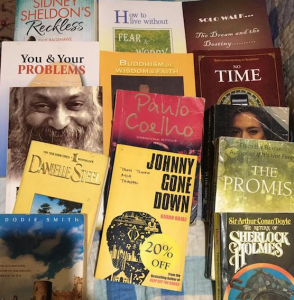
The book donation drive plans to provide reading materials to people in quarantine centres.
COVID-19 has changed many aspects of human life like how we socialise, work, shop and even basic hygiene practices such as washing hands.
But as we get used to what many now are beginning to call a new normal, BCMD got in touch with some youth and teachers who have been associated with BCMD through or many past activities on how they have been coping with this pandemic.
One of the participants of BCMD activities, Tshewang Ngedup and his fellow member of the Foundational Leadership Programme, Royal Institute for Governance and Strategic Studies has initiated a book donation drive across all 20 Dzongkhags (districts).
“Our objective is to keep our fellow countrymen in quarantine centres meaningfully engaged and encourage reading,” said Tshewang Ngedup. Until today the group received 1,004 books and 33 books were provided to quarantine centres in Paro. “In partnership with HOPE COVID-19 Bhutan, this initiative is intended to promote a reading and thinking society, as envisioned by His Majesty the King,” said Tshewang.
While schools remained closed, some teachers have joined De-suung, a national volunteer programme. Laxman Bista from Gomtu Middle Secondary School and Ugyen Kelzang from Gelephu Middle Secondary School both completed their intensive De-suung training. They are waiting for their placement in border patrols. Laxman and Ugyen have been involved in BCMD activities for several years, from the Youth Summit to co-ordinating the school’s media/democracy club.
Laxman Bista believes that “Besides teaching, providing voluntary service in the community is a prime responsibility and it’s payback time when the motherland is sailing through a pandemic COVID-19.”
YI Made Me More Matured
Tshering Samdrup, Youth Initiative talks about the transformation he underwent by attending the camps.
Attending the Youth Initiative (YI) has helped me explore my mind and build a stronger foundation to be comfortable in dealing with other people.
Before regardless of what it was, I remember always feeling a sense of nervousness but now, I find myself being able to interact with a sense of newfound confidence.
We received background training in topics like Gross National Happiness which I feel everyone should understand beyond its superficial aspects. Even when I go to my village during breaks, I find myself engaging willingly about our democratic and electoral processes. I find myself even interested in wanting to speak to people in the government such as our civil servants.
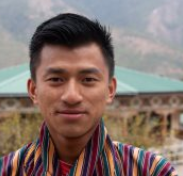
YI helped Tshering Samdrup take criticism positively.
As compared to other youth forums that I have attended in the past, YI was different in how inclusive it was and in revealing the interconnectedness we all live in. The YI helped us mould our mindset — to be broad and always in the service of the greater social good. This way of thinking has made us learn to genuinely appreciate criticisms for our presentations or group work. When we can transcend feeling personally attacked by critical comments to receiving it with a mindset of constant improvement, I feel we jump to the next level of maturity in thought and action.
From the Youngest YI Member
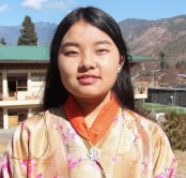
Sangay Dechen Gyanzo now takes interest in subjects like policies which she before thought was only meant for adults.
Sangay Dechen Gyanzo, the youngest member of YI shares her journey through the Youth Initiative and how it helped mature in thoughts and views on everything around her.
Before I joined the Youth Initiative (YI), I had absolutely no idea of policy-making. But after being in YI and learning about policy research, I could grow as a person and feel genuinely interested in learning more about politics and policies, which were topics that I felt were only for adults before.
The learnings from the Youth Initiative have also been applicable in my current life because I have a better understanding of rights and have been educating my friends as well in our conversations. Like me, I’ve seen my other colleagues like Tashi Lhaden and Rinchen Pelzang who have grown as persons right in front of my eyes.
During the focus group discussions where we went to various youth groups to collect their views and voices, we were able to hear stories about people and their personal lives. Even though we went in practically as strangers, they trusted us. Through this, I have become more confident since it tells us implicitly that we are trustworthy and that we can reach out to those for whom we can offer our help.
Being a Good Citizen in Dzongkha
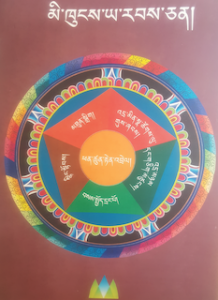
The Dzongkha handbook will enable us to reach out to the non-English speaking population, the unreached.
BCMD’s handbook on ‘Being a Good Citizen’ has been translated into Dzongkha.
The booklet is used as training material in the Bhutan Centre for Media and Democracy (BCMD) programmes to educate youths, teachers and public servants about citizenship. It covers topics on values such as interdependence and harmony, respect for diversity, equity and equality, integrity and courage. To supplement the understanding of the central idea of these values, brief explanations on each of the values are followed by reflective activities starting with self and moving on to thinking about how these values manifest in the larger societal contexts.
Thus far, the handbook has been used during Youth Summit, Media and Democracy and Literacy training, Project Mikhung and Peer Facilitation. The Dzongkha handbook is expected to cater to the needs of the ever-increasing participants of BMCD programmes coming from diverse needs and groups.
This handbook is supported by EU Helvetas Bhutan.
11th Issue of The Druk Journal Out
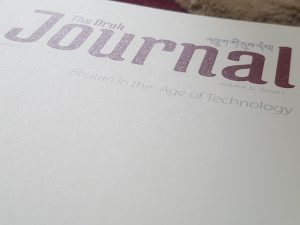
The issue will be made available on The Druk Journal website next week to keep people engaged at home, in quarantine centres and isolation wards.
The Spring Edition of The Druk Journal is out! Aptly titled, Bhutan in the Age of Technology, this edition is coming at a time when schools and colleges are closed and many are learning as well as working online from home in Bhutan.
The theme reflects Bhutan’s aspirations in a world of changing technology. The unforeseen COVID pandemic crisis has forced Bhutan, and the world, to bring technology alive in everyday living. Find out more about technology in Bhutan.
Look out also for the DJ conversation and seminar that’s coming in May. We will announce it on our FB page and website. You can also read the articles from this issue on our website, which we are uploading in the coming week to keep people engaged while at home, quarantine or isolation wards to overcome the virus. The 11th issue of The Druk Journal issue was supported by DIPD, Druk Holdings and Investment (DHI) and EU Helvetas Bhutan.
Promoting Civil Society Through Song
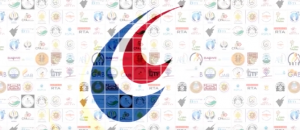
The song features works of CSOs in numerous areas of development.
A music video celebrating the civil society voice was launched as the nation, leaders, health professionals and citizens cope with the global pandemic. The song titled “Lhayuel Ngo Ma Dzogay” which roughly translates to “Let’s Make and True Heaven on Earth” that embodies the spirit of civil society — solidarity, compassion and courage — was offered to all those working hard to restore the light and bring hope to our nation. This music video was supported by EU Helvetas Bhutan.
Watch the song … https://www.youtube.com/watch?v=pfWn66r0nDs
Share
This note if you have someone in self-isolation and to those of you in self-isolation and quarantine, we have some interesting resources online to keep you engaged and occupied. We thank you for your endurance to keep us safe.
The links are shared below:
#Publications: www.bcmd.bt
#Videos: https://www.youtube.com/user/TheBcmd
#Podcasts: https://soundcloud.com/bcmd
If you like our works, you may …
Donate here … http://bcmd.bt/ (GlobalGiving) or http://bit.ly/2WkRjmw (Bhutan Foundation) or https://give2asia.org/bcmd/… (Give2Asia)
